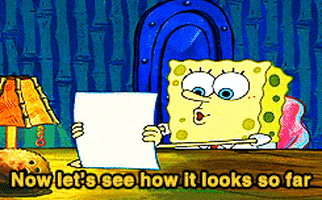Congratulations to you! You’ve written a thing. You’re super proud of it. You’ve sent it off to agents/ editors/ blurbers/ your mom, and you are not-so-patiently waiting to hear feedback. Okay, fine. You’re actually obsessing over that one typo that’s maybe on page 15 and trying not to burst into tears whenever you get an email notification. Sound familiar?
Because this is 100 percent me all of the time.
Unfortunately, the best advice for how to deal with the agony of waiting for feedback is also the hardest to follow. It goes like this:
Start something new.
See? Extremely hard to follow! Because how can you just… start something new when your head and your heart are with that other project you’re maybe still working on? Impossible!
But everyone who says this is correct. In my experience, it’s the only way to free your brain from spiraling into what if they hate it? territory. I started They’ll Never Catch Us while I was waiting for edits on They Wish They Were Us. And I started my new Super Secret Project That I Just Turned In at the beginning of 2020 while waiting for edits on They’ll Never Catch Us. Now I’m trying to start my next super secret project (okay, not so secret, it’s another YA book) and, yeah, it’s hard!
But nothing is scarier than a blank page. We all know this. That’s why it’s so damn tough to actually get your butt in the chair and write “Chapter 1.”
My advice? Don’t start there. At least I can’t. My brain doesn’t work that way. I need a lot of priming and brainstorming and daydreaming before I can get to those first magical words that I know will launch a story. Instead, I start with a few exercises that help me begin a new project from scratch. Maybe they’ll be useful to you? Either way, here they are:
I keep a running Note on my phone of story ideas.
These can be vague like “prep school secret society” or specific like “competitive cross country running sisters become wrapped up in the disappearance of a teammate in a small town in the Catskills.” (Oh hello, TNCU.) They’re the ideas that come to me while walking in the park, waking up in the morning, watching TV, or reading the news. They’re the ideas that jolt me upright and make me think—oh, that might be cool.
This Note is going at all times. Right now there are dozens of phrases in there. Most of them will turn into nothing. One might turn into my next novel.
I take my most compelling (to me) idea and start jotting down bullet points in a Word Doc.
Random thoughts. That’s it. No prose, no Chapter 1, just… ideas. Some examples from my They’ll Never Catch Us ideas doc:
Sisters who are more alike than they seem
Multiple POVs (make their voices SUPER different)
Small town mystery (make it claustrophobic)
Messed up families
Everyone has a defined secret (specific! Dark!)
Over time, this list might grow to be 10 pages. Some of the notes will be useless. Garbage! Nonsensical. But a few gems will stick out and after a few months of working on and off, the story might start to come together.
I outline with compassion.
What I mean by this is that I do outline once I decide I want to go all-in on a story. But I also give myself license to deviate from the outline. The outline is a guide that might help me understand the story but it’s not inflexible. The final drafts are always super different than the outline. But playing around in an outline helps me understand the characters, the setting, and the world in which I want the story to exist. It helps me figure out where I want to start and where I want to end. What happens in the middle is the stuff that changes the most.
When I’m stuck, I do “character free writes.”
Pretty sure that’s not a real term, but here’s what I mean: If I want to create a character but have no idea where to start, I’ll open a new Word Doc, set a timer for 20 minutes, and just write from their perspective. There’s no plot or setting or anything. It’s just the character’s inner monologue. Sometimes it’s a memory they might have. Other times they’re just going off about another character who bugs them.
These kinds of free writes are more helpful to me than “character bibles,” because I can really get into my characters’ voices and understand their motivations. Writing through them is more helpful to me than writing about them.
I list a bunch of scenes I think would be fun to write.
Let’s say you’re writing a book set at a prep school (heh). You know that setting’s not changing, but you have no idea what actually happens. Totally standard. Instead of freaking out (though, that’s fine, too), write a list of scenes that you think you’d enjoy writing. Some examples, taken from They Wish They Were Us:
PARTIES! One big house party that shows friendship dynamics
Bonfires on the beach
Road rally scavenger hunt
Diners! So many scenes at diners!
Have Jill take trips to the city. Show her in different neighborhoods
Welp, that’s it for now. Hopefully these can be helpful if you, like me, are trying to dive headfirst into a new project that seems impossible. We’re in it together, folks.
xx Jess
PS: You have a chance to win one of five early copies of They’ll Never Catch Us, which comes out July 27, over on Goodreads right now. Enter the giveaway here! And if you want to preorder a signed and personalized copy, you can get one at Greenlight or Books Are Magic (just make a note upon checkout).
But wait! There’s more! At the end of every issue of Word Count, I’ll leave you with a little post script I’m calling…
Counter Stats
✏️ What I’m Working On: An idea for my next YA book.
✏️ Total Word Count: 2,026. I’m really just playing around here, getting a feel for what could be.
✏️ Today’s Word Count: 346 (‘twas a teensy baby writing day!)
✏️ Marching Orders: No drafting tomorrow. Work on the outline by following your own advice: List a lot of scenes that would be fun to write.






Literally just started a new project today so taking today's topic as a nod to go ahead!